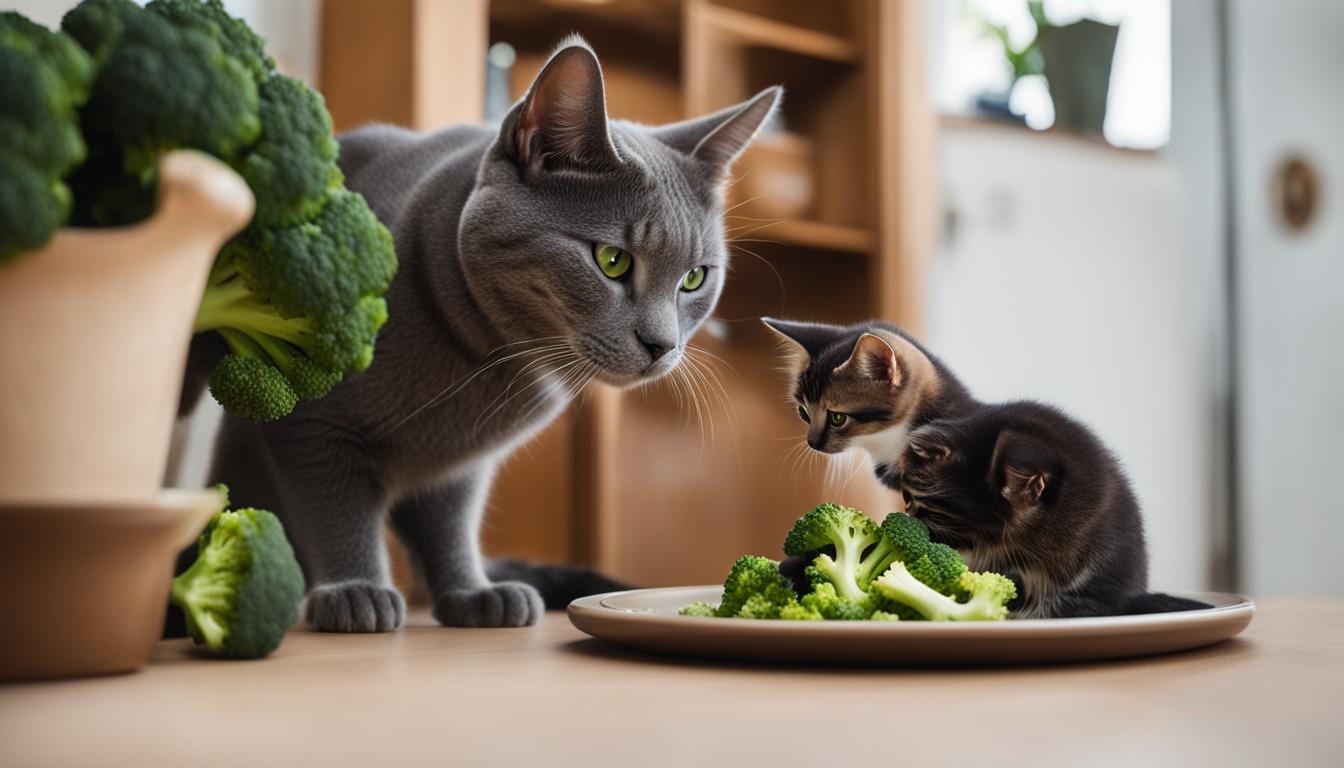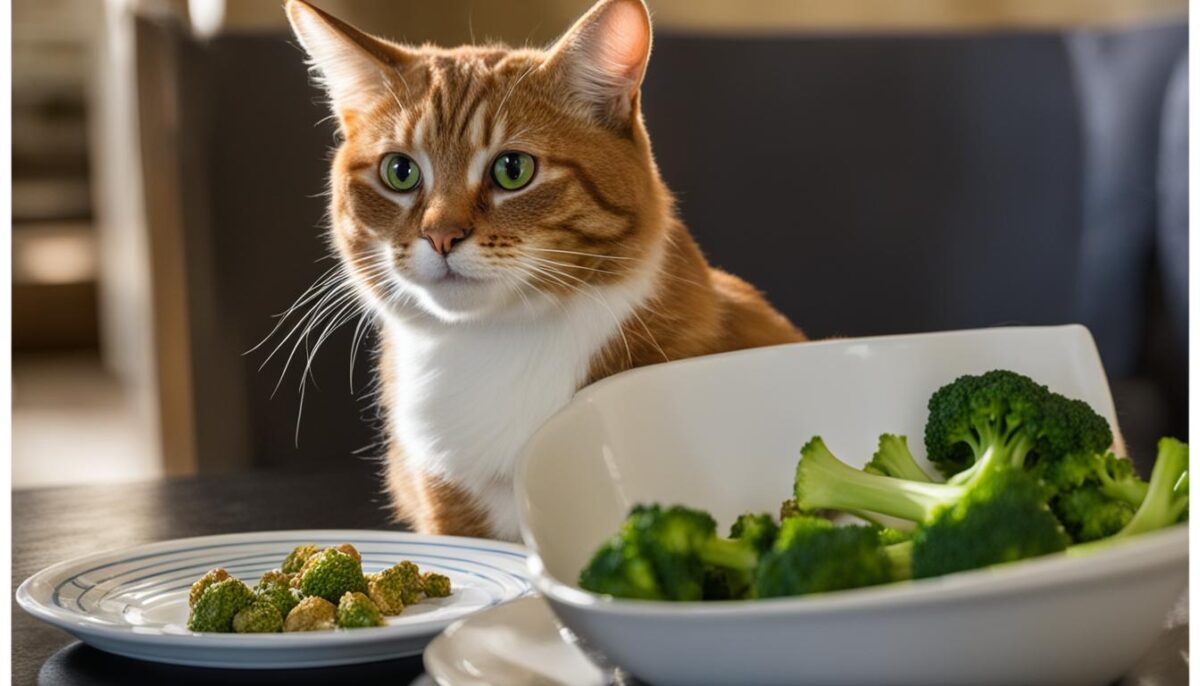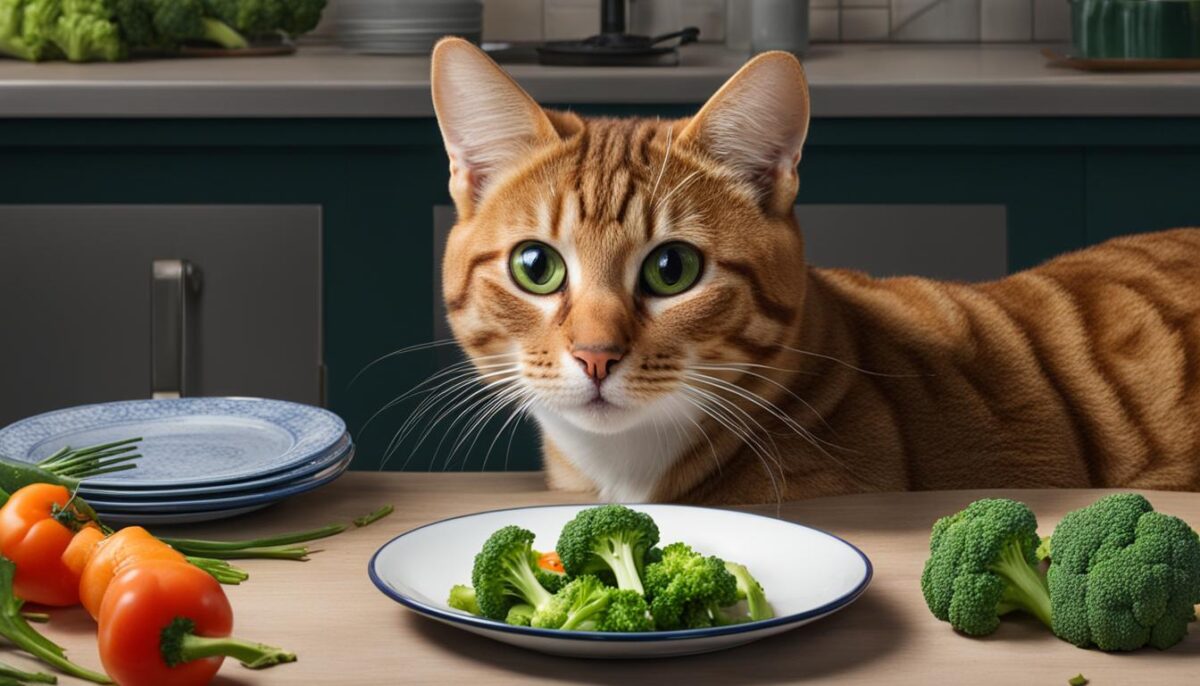When it comes to our furry friends, we always want to make sure we’re giving them the best. As cat owners, we know that our feline companions have different nutritional needs than humans and dogs. While cats are obligate carnivores and primarily thrive on meat, there are certain vegetables that can actually be beneficial for their health. One such vegetable is broccoli. But before you start serving up a plate of greens for your kitty, let’s delve into the topic further to understand the dos and don’ts of feeding cats broccoli.
Key Takeaways:
- Broccoli is safe for cats to eat in small amounts and can provide essential nutrients.
- It’s rich in vitamin C, carotenoids, and dietary fiber, which contribute to a cat’s overall health.
- When serving broccoli to cats, it’s best to steam, blanch, or boil it to enhance digestibility.
- Avoid seasoning broccoli with any spices or oils that may be toxic to cats.
- While broccoli is safe for cats, there are other cat-friendly vegetables to consider for added variety.
Can Cats Eat Broccoli and What are the Health Benefits?
Cats can safely consume broccoli and it can provide them with several health benefits. While cats are primarily carnivorous animals, small amounts of certain vegetables can be beneficial for their overall well-being. Broccoli is one such vegetable that offers nutritional value to cats.
Broccoli is rich in vitamin C and carotenoids, which are powerful antioxidants that support a cat’s immune system and help protect against free radicals. These compounds can contribute to the overall health and longevity of cats. Additionally, broccoli is a good source of dietary fiber, aiding in digestion and promoting a healthy weight in cats.
When serving broccoli to cats, it is important to prepare it properly to ensure it is safe and easily digestible for them. Steaming, blanching, or boiling broccoli can enhance its digestibility. It is essential to avoid seasoning the broccoli with any spices or oils that may be harmful to cats.
| Benefits of Broccoli for Cats: |
|---|
| Rich in vitamin C and carotenoids |
| Supports the immune system |
| Aids in digestion |
| Promotes a healthy weight |
Remember, moderation is key when feeding broccoli to cats. It should only be offered as a supplement or occasional snack in small amounts. Always consult with a veterinarian before introducing any significant changes to your cat’s diet.
How to Serve Broccoli to Cats Safely
When it comes to serving broccoli to your feline friend, it’s important to ensure that it is safe and digestible for them. Cats have sensitive digestive systems, so preparation and presentation can make a difference in their ability to enjoy this vegetable. Here are some tips to serve broccoli to cats safely:
- Choose the right cooking method: Steaming, blanching, or boiling broccoli can help enhance its digestibility for cats. These methods soften the vegetable, making it easier for cats to consume and digest. Avoid serving raw broccoli as it may be harder for cats to break down and digest.
- Avoid seasonings: Cats have different taste preferences than humans, and some seasonings commonly used on broccoli, such as salt or spices, may not be safe for them. It’s best to serve plain, unseasoned broccoli to cats.
- Introduce it gradually: If your cat is trying broccoli for the first time, start with small portions as a snack or supplement to their regular meals. Monitor their reaction to ensure they tolerate it well. If you notice any digestive upset or adverse reactions, consult with your veterinarian.
Remember, while broccoli can be a healthy addition to your cat’s diet, it should never replace their main source of nutrition, which should come from high-quality meat-based cat food. Broccoli should only be offered as an occasional treat or supplement to provide some additional nutrients and variety in their diet.
By following these guidelines, you can safely serve broccoli to your cat, knowing that you are providing them with a nutritious and enjoyable snack. As always, consult with your veterinarian if you have any concerns or questions about your cat’s diet or specific dietary requirements.
Other Safe Vegetables for Cats
In addition to broccoli, there are several other vegetables that can be safely incorporated into a cat’s diet. These vegetables provide additional nutrients and variety to their meals while promoting overall health. Here are some cat-friendly vegetables:
Carrots:
Carrots are a great source of fiber and beta-carotene, which supports healthy eyesight and immune function. Cooked carrots are easier for cats to digest and can be served as a tasty treat or added as a topping to their regular meals.
Spinach:
Spinach is packed with vitamins A, C, and K, as well as iron and calcium. Steamed spinach is the best way to serve it to cats, as raw spinach may be difficult for them to digest. However, it is important to note that spinach should be given in moderation due to its high oxalate content.
Lettuce:
Lettuce can be a refreshing and hydrating addition to a cat’s diet. Opt for dark leafy greens like romaine or spinach lettuce, as they are rich in vitamins A and K. Offer lettuce as shredded pieces or mix it into their regular meals for added crunch.
| Veggie | Benefits |
|---|---|
| Carrots | Source of fiber and beta-carotene, supports eyesight and immune function |
| Spinach | Rich in vitamins A, C, and K, iron, and calcium |
| Lettuce | Refreshing, hydrating, and contains vitamins A and K |
Note: Always introduce new vegetables gradually and observe your cat’s response. Some cats may have specific dietary needs or sensitivities, so it’s best to consult with a veterinarian before incorporating new vegetables into their diet.
Vegetables to Avoid Feeding Cats
While many vegetables are safe for cats to eat, it’s essential to be aware of some varieties that should be avoided. Certain vegetables can be toxic to cats and may cause harm to their health. Here are some vegetables that you should not feed to your feline friend:
- Onions and Garlic: Onions and garlic belong to the allium family and can be highly toxic to cats. They contain compounds that can damage a cat’s red blood cells and lead to anemia.
- Raw Potatoes and Potato Skins: Raw potatoes and potato skins should not be given to cats. These contain solanine, a toxic substance that can cause gastrointestinal upset and other health issues.
- Raw Beets: Raw beets can be difficult for cats to digest and may cause digestive problems. It’s best to avoid feeding them raw beets to prevent any potential issues.
It’s crucial to be mindful of what you feed your cat and ensure their safety and well-being. If your cat accidentally ingests any of these vegetables or shows any signs of discomfort or illness, it’s recommended to consult with a veterinarian as soon as possible.
Table: Vegetables to Avoid Feeding Cats
| Vegetable | Reasons to Avoid |
|---|---|
| Onions and Garlic | Contain compounds that can damage a cat’s red blood cells |
| Raw Potatoes and Potato Skins | Contain solanine, a toxic substance that can cause gastrointestinal upset |
| Raw Beets | Difficult to digest and may cause digestive problems |
Precautions When Feeding Cats Vegetables
Feeding cats vegetables can be a healthy addition to their diet, but it’s important to take some precautions to ensure their safety and well-being. Here are some guidelines to follow when introducing vegetables like broccoli to your feline friend:
A gradual introduction
Start by offering small amounts of vegetables to your cat, mixed with their regular food. Cats have different preferences and tolerances, so it’s essential to introduce new foods gradually. Monitor your cat’s reaction and digestion to ensure they are tolerating the vegetables well.
Be mindful of toxic foods
While broccoli is safe for cats, some vegetables can be toxic to them. Avoid feeding your cat onions, garlic, or any vegetables from the allium family, as they can cause damage to their red blood cells. It’s always a good idea to familiarize yourself with which vegetables are safe and which ones should be avoided.
Consult with a veterinarian
Before making any significant dietary changes for your cat, consult with a veterinarian. They can provide personalized advice based on your cat’s specific needs and health conditions. They can also guide you on the appropriate portion sizes and frequency of vegetable feeding for your cat.
Remember, vegetables should be offered as supplements or snacks and should not replace the main portion of a cat’s meal. With proper precautions and moderation, feeding your cat vegetables like broccoli can be a beneficial addition to their diet.
Tips for a Balanced and Healthy Cat Diet
While small amounts of vegetables can be beneficial for cats, it is important to remember that they are obligate carnivores and require a predominantly meat-based diet. Vegetables should only be offered as supplements or snacks, never as the main portion of a cat’s meal. A balanced and healthy cat diet consists primarily of high-quality protein sources, such as meat, along with necessary vitamins and minerals.
It is essential to provide your cat with a variety of cat-friendly vegetables to ensure they receive a well-rounded diet. Some cat-friendly vegetables that can be included in their diet are:
- Steamed broccoli: Broccoli is safe for cats and provides essential nutrients like vitamin C and dietary fiber.
- Cooked potatoes (without the skin): Potatoes can be a good source of carbohydrates for cats.
- Carrots (cooked): Carrots are rich in beta-carotene and can benefit your cat’s overall health.
- Steamed spinach: Spinach is packed with vitamins and minerals that can support your cat’s immune system.
- Lettuce: Lettuce is a hydrating and low-calorie option that can add some variety to your cat’s diet.
- Celery: Celery can provide crunch and fiber for your cat’s digestion.
- Asparagus (in small amounts): Asparagus contains folate and essential nutrients that can contribute to your cat’s well-being.
- Cauliflower: Cauliflower is a nutritious option that can aid in digestion and provide antioxidants.
Remember to introduce these vegetables gradually and in small amounts, monitoring your cat’s response to ensure they tolerate them well. It’s always a good idea to consult with your veterinarian before making any significant dietary changes for your cat.
Offering a balanced and healthy diet, including cat-friendly vegetables, can contribute to your cat’s overall well-being and provide them with the essential nutrients they need to thrive. Remember to prioritize meat-based sources of protein and consult with your veterinarian for personalized dietary recommendations for your furry friend.
| Cat-Friendly Vegetables | Nutritional Benefits |
|---|---|
| Steamed Broccoli | Rich in vitamin C and dietary fiber |
| Cooked Potatoes (without skin) | Good source of carbohydrates |
| Carrots (cooked) | Rich in beta-carotene |
| Steamed Spinach | Packed with vitamins and minerals |
| Lettuce | Hydrating and low-calorie option |
| Celery | Provides crunch and fiber |
| Asparagus (in small amounts) | Contains folate and essential nutrients |
| Cauliflower | Aids in digestion and provides antioxidants |
Conclusion
In conclusion, broccoli can be a safe and healthy addition to your cat’s diet. It is important to remember that cats are obligate carnivores and require a primarily meat-based diet. However, offering small amounts of broccoli as a supplement or snack can provide them with essential nutrients.
When feeding cats broccoli, it is important to serve it in a safe and digestible manner. Steamed, blanched, or boiled broccoli is the best option, without any added spices or oils. It is also crucial to introduce vegetables slowly and monitor your cat’s reaction.
While broccoli is safe for cats, it should not be the main portion of their meal. A balanced and healthy cat diet consists mainly of high-quality protein sources, such as meat, along with necessary vitamins and minerals. Always consult with a veterinarian before making any significant changes to your cat’s diet.
FAQ
Can cats eat broccoli?
Yes, cats can eat broccoli. It is safe and healthy for them when served in moderation.
What are the health benefits of broccoli for cats?
Broccoli is rich in vitamin C and carotenoids, which are beneficial antioxidants for cats. It also provides dietary fiber for digestion and maintaining a healthy weight.
How should I serve broccoli to cats safely?
It is best to serve steamed, blanched, or boiled broccoli to enhance its digestibility. Avoid seasoning the broccoli with any spices or oils that may be toxic to cats.
Are there other vegetables that are safe for cats?
Yes, cooked potatoes (without the skin), carrots (cooked), spinach (steamed), lettuce, celery, asparagus (in small amounts), and cauliflower are safe vegetables for cats.
Which vegetables should I avoid feeding cats?
Cats should not be fed onions, garlic, or any vegetables from the allium family, as they can be toxic and cause damage to their red blood cells. Raw potatoes, potato skins, and raw beets should also be avoided.
What precautions should I take when feeding cats vegetables?
Start with small amounts and monitor their reaction. Cats may not be interested in eating vegetables, so do not force them. Consult with a veterinarian before making any significant dietary changes for your cat.
What should a balanced and healthy cat diet consist of?
A balanced cat diet consists primarily of high-quality protein sources, such as meat, along with necessary vitamins and minerals. Vegetables should only be offered as supplements or snacks, never as the main portion of a cat’s meal.
Is feeding cats broccoli a good idea?
Broccoli can be a beneficial addition to a cat’s diet when served in moderation. However, it is important to consult with a veterinarian before making any significant changes to your cat’s diet.


